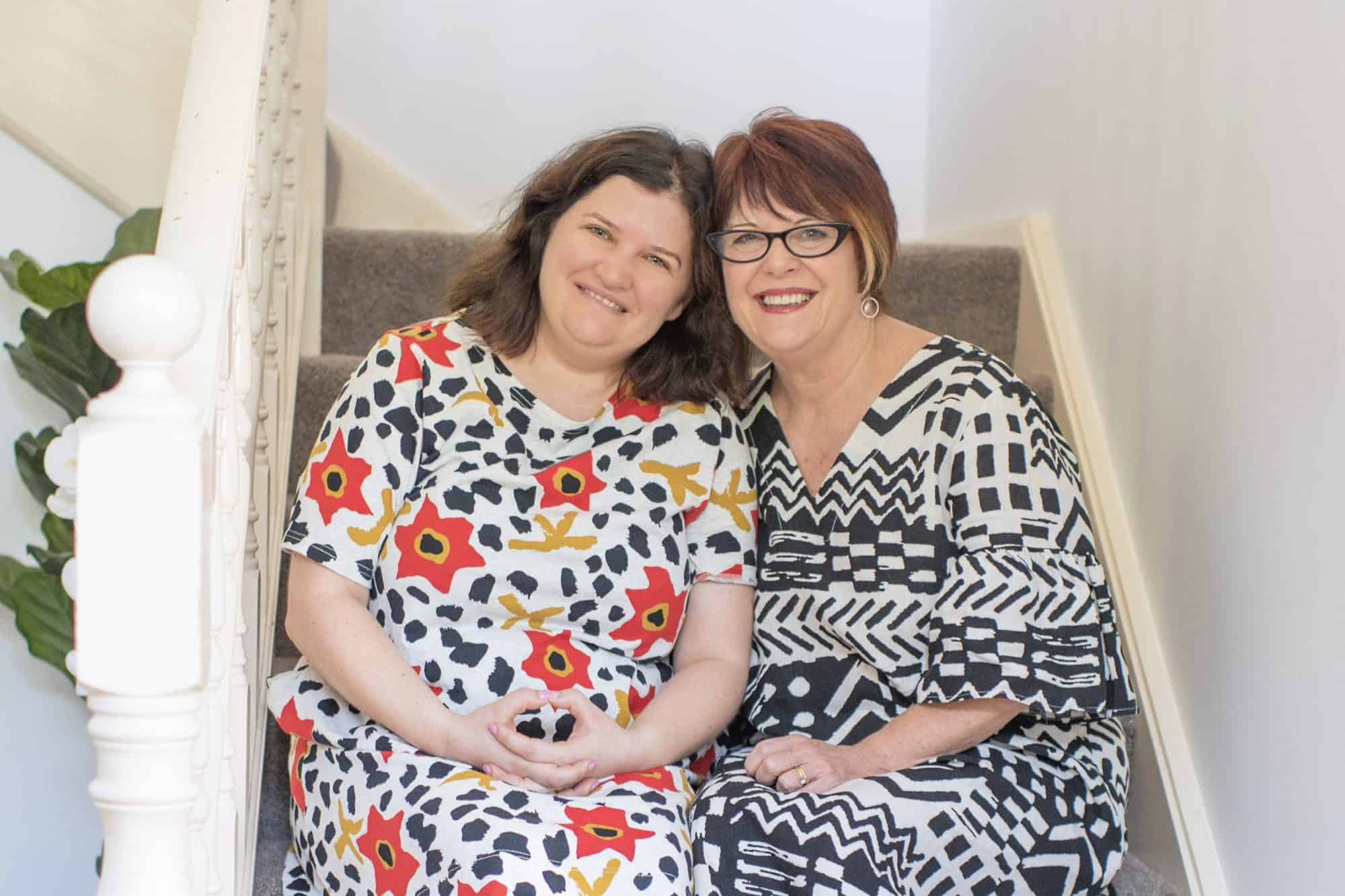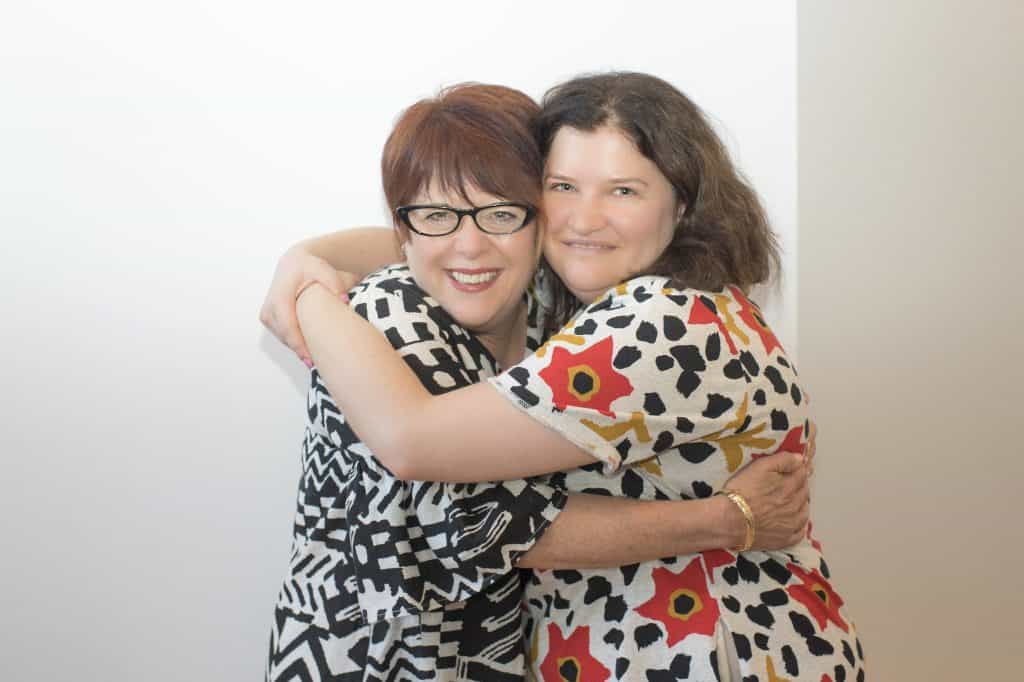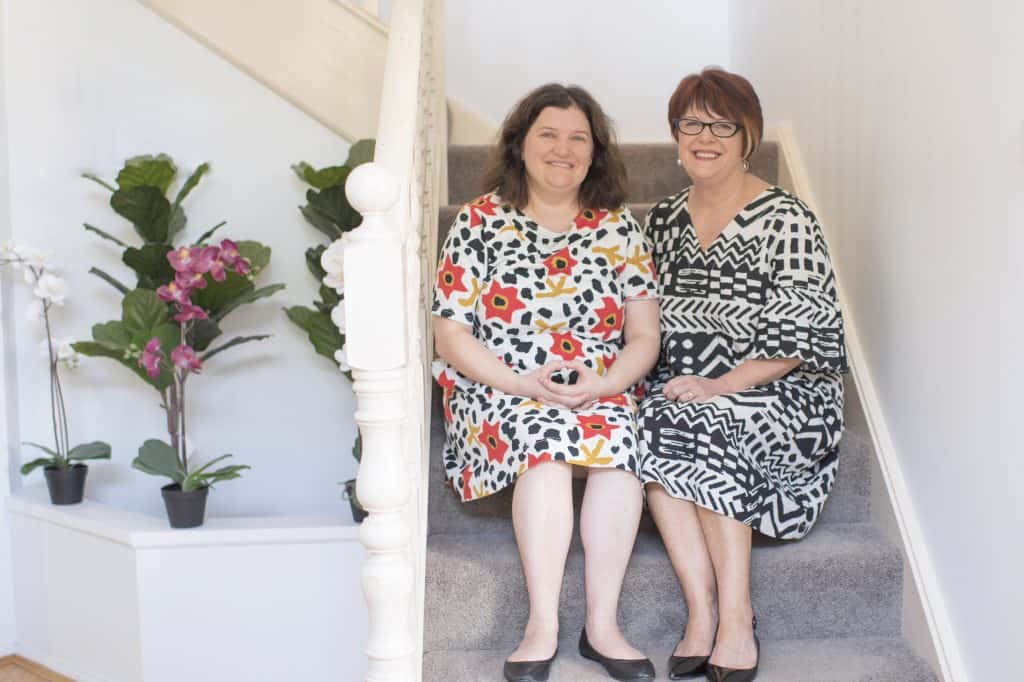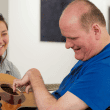
Now in their sixties, and with their daughter, Lauren, still living at home, Narelle and her husband felt it was time to explore independent living for their daughter. Now living her best life, we caught up with Lauren and her parents 12 months on, to find out all about her journey to independent living.
Lauren flew the family nest more than a year ago, and while her mum admits it took some adjustment, she is loving her new-found independence, living with four other like-minded females in a welcoming and friendly home.
“After consulting Lauren, my husband and I were concerned that perhaps we were over-parenting,” says Lauren’s mum, Narelle, when asked what prompted the move.
“We are now at a point in our lives where we felt that realistically we have 20 years or so to prepare Lauren for a time when we are not around,” she continues. “Right away we needed to start supporting her to build her independence and confidence.”

“SOMEWHERE TO SPREAD HER WINGS”
“It was difficult for us to offer opportunities for independence without being stressed about where she was or what she was doing. Lauren and I are very close, but as a woman in her 30s, we were treating her as a much younger person,” says Narelle. “We were looking for somewhere Lauren could have some space from us; to meet new people and be surrounded with people her own age; to safely spread her wings to feel like her own person.”
To prepare themselves for the move, the family attended a number of information sessions at Civic Disability Services, where they learnt all about supported independent living and how to go about finding the right accommodation for Lauren. This also provided the opportunity to ask questions and raise concerns. They then visited some other homes in south Sydney, where Civic support people living with disability to live independently and achieve their goals, so they could see first-hand what it was like.
AN EXCITING TRANSITION
With Lauren’s agreement, Narelle and her husband decided to support their daughter to transition into supported independent living. And, rather than this being a daunting task, Narelle says moving into her new home was exciting for Lauren, allowing her the opportunity to forget her disability and move in with peers just like anyone else. “She was moving in with four other girls, so we did things like all going shopping to decorate their rooms,” says Narelle.
Now more than 12 months since she moved in, the opportunity to live more independently has given Lauren a boost.
“Since moving out of the family home, we’ve seen a marked improvement in Lauren’s confidence and independence,” says Narelle.
“She is doing things for herself that she hasn’t previously, and when she comes to visit us, she does more around the house for me, things like laundry and washing up. When we go shopping, she takes the initiative in speaking to people, rather than waiting for me to take the lead.”

A GREAT PARTNERSHIP
“In the beginning, I was worried that Lauren wasn’t paying attention to personal care; not washing her hair properly, forgetting to trim her nails, but once our concerns were raised the team at Civic worked with Lauren to learn and adopt those important life skills.
“What we liked about Civic was that it’s not one size fits all,” says Narelle. “There is a lot of tailored support and a big focus on development. They are always looking at new activities and opportunities to grow and stimulate Lauren. My husband and I feel we have a great partnership with them in meeting our daughter’s needs.”
If you’ve been inspired by Narelle’s story, read on for more information about SIL and to explore the options available for living more independently.
WHAT IS SUPPORTED INDEPENDENT LIVING (SIL)?
If you have a disability, Supported Independent Living (SIL) provides a way for you to live on your own, or share a home, while maintaining as much independence as possible. Support is on hand, and available around the clock for when it is needed.
Under the National Disability Insurance Scheme (NDIS), SIL accommodation is for between 2-7 people, each with their own private bedroom.
The types of supports available can include:
- Personal care such as showering and dressing
- Support with grocery shopping
- Assistance with daily skills training
- Promote participation in household and community activities
- Help to manage money and household budgeting
- Assistance with cooking
- Assistance with cleaning and laundry
- Help to catch public transport to visit friends and family
WHAT TO DO IF YOU, OR SOMEONE CLOSE TO YOU IS READY TO LIVE MORE INDEPENDENTLY?
There are a number of practical steps to take for anyone getting ready to move out of home and into SIL.
- Set a goal: all NDIS funding is connected to an individual’s goals, so the desire to live more independently need to be added to your plan, in order to receive funding for Supported Independent Living (SIL).
- Engage a Support Coordinator: they will determine the level and type of support needed to live more independently and then help find a suitable service provider. There will be some paperwork, and a number of assessments needed to determine the level of support required.
- Find a Service Provider: a support co-ordinator will help find the best provider based on individual needs.
HOW TO PREPARE FOR SINGLE INDEPENDENT LIVING (SIL)
- Plan ahead: Moving out is a major life change for anyone. When thinking about supported living, it’s important to plan ahead. This can help everyone involved adjust to the change. It can also help make the process smoother.
- Think long term: It’s worth noting that preparing to live independently after living at home for a long time can be a long process, and it may be something that you work towards gradually.
- Take time to prepare: For parents preparing their son or daughter for a move out of home for the first time, it is good idea to raise the topic early and ensure your teenage or adult child is included in the entire planning process.
- Know what’s important to you: Review all the available options and ensure choice and control are front and centre of the journey there are some key questions to determine preferences:
- Who do you want to live with?
- Where do you want to live?
- What’s important to you?
- What will your home look like?
- What activities will you do during the day?
- What shops, services and transport links do you need to be close to?
- What additional support will you need?
Think about which day-to-day tasks which you, or your family member needs help with, in order to select the most appropriate accommodation.
GETTING READY FOR THE CHANGE
Introducing the change gradually is key to keeping it from becoming overwhelming. Acknowledge that whilst moving out is a bit scary, it is a normal part of life with a whole of positives – for example, spending more time with friends, having more independence, having your own space, having more freedom, etc. When the move happens be ready for an adjustment period, and your son or daughter may take a little time to settle in. This is not unusual but having the right preparation and the right support in place will make the change easier.
ACKNOWLEDGE YOUR OWN FEELINGS
Lauren’s mum, Narelle admitted to a wave of guilt during the process of supporting her daughter to move out of home. She said: “In some ways it would have been easier to just have Lauren stay with us, to avoid the associated “mum guilt” but we knew that that wasn’t doing the right thing by her. We also felt a huge adrenaline drop once she moved out, there wasn’t that constant feeling of being on high-alert.”
As well as being a big step for your son or daughter, leaving home is also a big change for you as a parent. You may feel worried, anxious or sad about your son or daughter leaving home. You may feel that support workers won’t be able to provide the same level of care that you do. This is quite normal and it’s OK to feel this way.
Whilst there is always a sense of ‘letting go’ when your son or daughter moves out, you will still be very much a part of their life and support network. As a parent, you know your son or daughter best and should be fully involved in the support planning process and support staff should listen to and value what you say. Some people choose to move into supported living placements very close to home, so that the support network of family and friends is always close by. This can sometimes help make the transition easier. However, this option is not always possible for everyone.
CIVIC DISABILITY SERVICES IS HERE TO HELP
As leading experts in accommodation services, Civic has supported individuals with disability for more than 60 years. It is our mission to support individuals with disability to realise their full potential and lead actively engaged lives, fostering choice and independence. Civic is here to support you and your family through the entire process.
FINDING ACCOMMODATION WITH CIVIC
If you’re looking for a place to call home, be it living alone or with others, Civic can match you to the right accommodation to meet your needs. Civic’s accommodation options are complemented with access to community services, employment, and education, supporting you to live as independently as possible. Support from Civic is:
- Individualised – tailored to your needs and wishes
- Responsive – adapts to your continually changing needs
- Controlled by you – you decide the type of services you support and receive
WHAT ACCOMMODATION OPTIONS ARE AVAILABLE?
Appropriate housing is the key to independence. Civic’s long-stay options include shared living homes, individual apartments, as well as purpose-built developments. Whatever your circumstances, we can help you to find a supporting and welcoming home that ticks all the boxes.
SHARED LIVING HOMES
Civic has a wide selection of supported independent share-houses for groups of two or more. Living options include multi-room houses, self-contained units and villas. This is a good option for people who want to live independently, but also maintain a social network, make friends, and participate in the community through employment or community hubs.
Civic’s extensive expertise is used to match you not only to the right accommodation type, but also with the right people in order to ensure the best long-term fit for you. Civic’s friendly and experienced team will guide you through the whole process and provide support at each stage.
As a housemate, sharing with others, you are encouraged to share roles and responsibilities within the home to enhance independence, and meet up regularly to discuss and plan tasks and events. Staff will be on hand to offer support with daily tasks such as cleaning, laundry, goal setting and grocery shopping.
AGED CARE ACCOMMODATION
It’s important to be able to transition into appropriate accommodation as we age; Civic’s Aged Care Short Stay accommodation is a secure option with usually only three guests at any one time. Independent rooms are available, together with rooms attached to staff areas for those that require a greater level of support.
This type of accommodation is suitable for people of all abilities, who are aged 65 and over. Think of it as a short holiday where you can socialise with others, go on outings or relax in your apartment.
Situated in a prime location within the Sutherland Shire, close to cafés, beaches and parks. Tell us about your favourite activities and we try our best to incorporate these into your stay with us.
SPECIALIST DISABILITY ACCOMMODATION
Specialist Disability Accommodation (SDA) refers to accommodation for people who require specialist housing solutions to assist with and support extreme functional impairment or very high support needs.
Civic aims to deliver on the growing need for modern, functional homes, specially designed for people with disability. Civic’s Specialist Disability Accommodation (SDA), are homes which combine universal design principles, together with features tailored for individual needs.
This purpose-built accommodation is fully accessible and includes lifts, lowered kitchen benches and cupboards for wheelchair access, video intercom, duress alarms, garage and, in some instances, electronic window blinds. The accommodation aims to provide seamless integration with the local community, and is conveniently located close to public transport links, shops and community services, supporting individuals to have more independence while receiving the care they require.
Individuals with housing as one of the supports listed in their NDIS plan, may also be entitled to receive NDIS SDA funding to help with the financial side of things. In most cases this supports the person’s need to live in purpose-built Specialist Disability Accommodation (SDA) in order to receive the level of care which is required.
APARTMENT LIVING
In line with Civic’s enduring mission to realise human potential, we have expanded our accommodation offering to include high quality, accessible apartments for people with high physical support needs.
Civic has long been a champion for inclusivity of those with disability. In looking ahead to the future, Civic is committed to conceiving best-practice housing models that boost independence whilst creating a lasting community for clients.
These apartments are situated in prime locations; close to transport, shops and other amenities; and feature open plan living and stylish finishes. A variety of on-site support options are available for clients with disabilities.
TALK TO US
To find out more about Civic’s accommodation options, and to find a home that meets your needs, contact the Customer Experience Team on 1300MYCIVIC (1300 692 484) or email enquiries@civic.org.au



